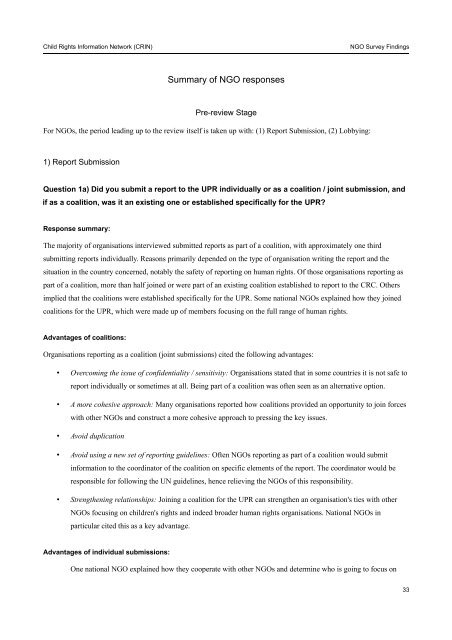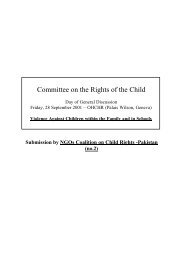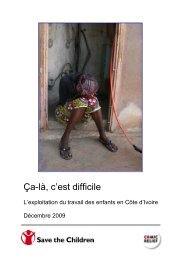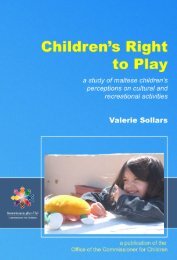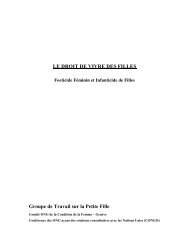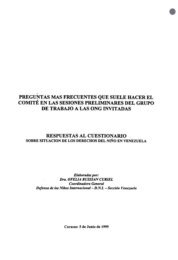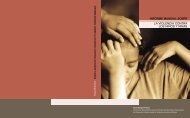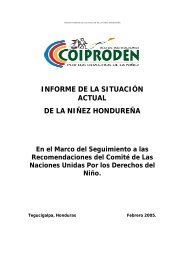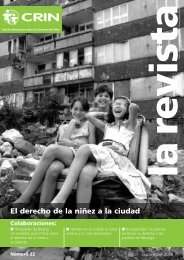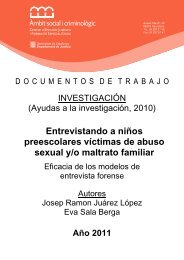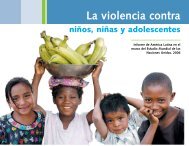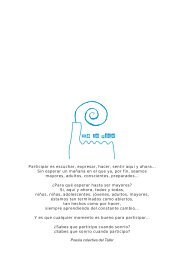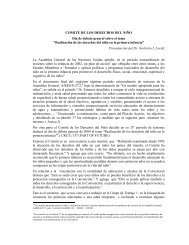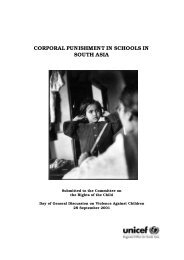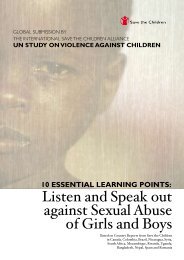Universal Periodic Review: The Status of Children's Rights - CRIN
Universal Periodic Review: The Status of Children's Rights - CRIN
Universal Periodic Review: The Status of Children's Rights - CRIN
You also want an ePaper? Increase the reach of your titles
YUMPU automatically turns print PDFs into web optimized ePapers that Google loves.
Child <strong>Rights</strong> Information Network (<strong>CRIN</strong>) NGO Survey Findings<br />
Summary <strong>of</strong> NGO responses<br />
Pre-review Stage<br />
For NGOs, the period leading up to the review itself is taken up with: (1) Report Submission, (2) Lobbying:<br />
1) Report Submission<br />
Question 1a) Did you submit a report to the UPR individually or as a coalition / joint submission, and<br />
if as a coalition, was it an existing one or established specifically for the UPR?<br />
Response summary:<br />
<strong>The</strong> majority <strong>of</strong> organisations interviewed submitted reports as part <strong>of</strong> a coalition, with approximately one third<br />
submitting reports individually. Reasons primarily depended on the type <strong>of</strong> organisation writing the report and the<br />
situation in the country concerned, notably the safety <strong>of</strong> reporting on human rights. Of those organisations reporting as<br />
part <strong>of</strong> a coalition, more than half joined or were part <strong>of</strong> an existing coalition established to report to the CRC. Others<br />
implied that the coalitions were established specifically for the UPR. Some national NGOs explained how they joined<br />
coalitions for the UPR, which were made up <strong>of</strong> members focusing on the full range <strong>of</strong> human rights.<br />
Advantages <strong>of</strong> coalitions:<br />
Organisations reporting as a coalition (joint submissions) cited the following advantages:<br />
• Overcoming the issue <strong>of</strong> confidentiality / sensitivity: Organisations stated that in some countries it is not safe to<br />
report individually or sometimes at all. Being part <strong>of</strong> a coalition was <strong>of</strong>ten seen as an alternative option.<br />
• A more cohesive approach: Many organisations reported how coalitions provided an opportunity to join forces<br />
with other NGOs and construct a more cohesive approach to pressing the key issues.<br />
• Avoid duplication<br />
• Avoid using a new set <strong>of</strong> reporting guidelines: Often NGOs reporting as part <strong>of</strong> a coalition would submit<br />
information to the coordinator <strong>of</strong> the coalition on specific elements <strong>of</strong> the report. <strong>The</strong> coordinator would be<br />
responsible for following the UN guidelines, hence relieving the NGOs <strong>of</strong> this responsibility.<br />
• Strengthening relationships: Joining a coalition for the UPR can strengthen an organisation's ties with other<br />
NGOs focusing on children's rights and indeed broader human rights organisations. National NGOs in<br />
particular cited this as a key advantage.<br />
Advantages <strong>of</strong> individual submissions:<br />
One national NGO explained how they cooperate with other NGOs and determine who is going to focus on<br />
33


